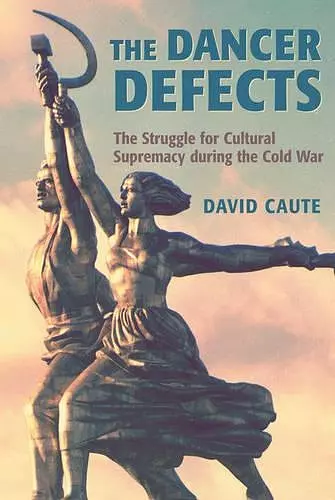The Dancer Defects
The Struggle for Cultural Supremacy during the Cold War
Format:Paperback
Publisher:Oxford University Press
Published:21st Jul '05
Currently unavailable, and unfortunately no date known when it will be back
This paperback is available in another edition too:
- Hardback£71.00(9780199249084)

The cultural Cold War between the Soviet Union and the West was without precedent. At the outset of this original and wide-ranging historical survey, David Caute establishes the nature of the extraordinary cultural competition set up post-1945 between Moscow, New York, London, and Paris, with the most intimate frontier war staged in the city of Berlin. Using sources in four languages, the author of The Fellow-Travellers and The Great Fear explores the cultural Cold War as it rapidly penetrated theatre, film, classical music, popular music, ballet, painting, and sculpture, as well as propaganda by exhibition. Major figures central to Cold War conflict in the theatre include Brecht, Miller, Sartre, Camus, Havel, Ionesco, Stoppard, and Konstantin Simonov. Among leading film directors involved were Eisenstein, Romm, Chiarueli, Aleksandrov, Kazan, Tarkovsky, and Wajda. In the field of music, the Soviet Union in the Zhdanov era vigorously condemned 'modernism', 'formalism', and the avant-garde. A chapter is devoted to the intriguing case of Dmitri Shostakovich, and the disputed authenticity of his 'autobiography' Testimony. Meanwhile in the West the Congress for Cultural Freedom was sponsoring the modernist composers most vehemently condemned by Soviet music critics, notably Stravinsky. The Soviet Party was unable to check the appeal of jazz on the Voice of America, then rock music, to young Russians. Visits to the West by the Bolshoi and Kirov ballet companines, the pride of the USSR, were fraught with threats of cancellation and the danger of defection. Caute dampens overheated speculations about KGB plots to injure Rudolf Nureyev and other defecting dancers. Turning to painting, where socialist realism prevailed in the USSR and dissident art was often brutally repressed, Caute explores the paradox of Picasso's membership of the French Communist Party. Re-assessing the extent of covert CIA patronage of abstract expressionist artists like Jackson Pollock, Caute finds that the CIA's role has been much exaggerated. Caute also challenges some recent accounts of 'Cold War culture', which virtually ignore the Soviet performance and cultural activity outside the USA. Soviet artistic standards and teaching levels were exceptionally high, but the regime's endemic fear of free innovation finally accelerated its collapse.
Review from previous edition This is a wonderful biography of the Cold War, fluent and crammed with detail * Lesley Chamberlain, The Independent Magazine *
for the big picture as well as plenty of little ones, the result is masterly * The Economist *
This is a profound study of a vast subject which was, we now see, a vital aspect of the Cold War. One now eagerly awaits the second volume. * Contemporary Review *
Well-written, meticulously researched, peopled with a cast from Stalin to Nureyev, Eisenstein to Jackson Pollock. * Simon Sebag Montefiore, Financial Times magazine *
This is a titanic achievement. * Brian Morton, Sunday Herald (Glasgow) *
... impressive ... Caute encompasses theatre, film, painting, sculpture, classical music, jazz, rock and ballet - with a text that reads with virtuoso fluency. * Classic FM - The Magazine *
... curious and absorbing new book ... an important book. * Geoffrey Wheatcroft, Times Literary Supplement *
This is a remarkably thorough and well-researched book, and will become the standard work on the subject. * Simon Heffer, The Literary Review *
Extraordinary stories ... Caute is at his best when he drily lampoons today's (mostly) American academics who retroactively see cold war cultural politics in just about everything. * Peter Aspen, Financial Times *
ISBN: 9780199278831
Dimensions: 229mm x 150mm x 40mm
Weight: 1246g
818 pages